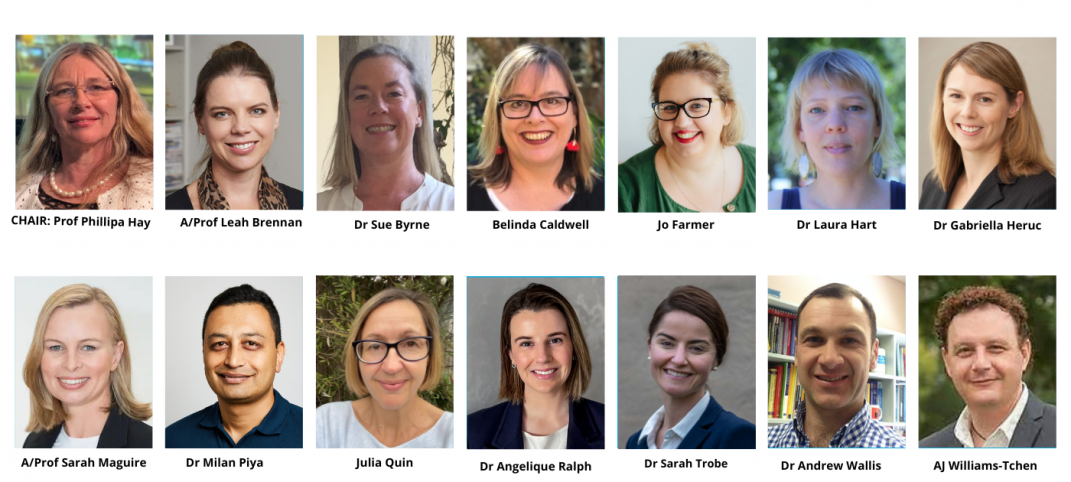Why we need this Guideline
Despite the high prevalence, eating disorders experienced by people with higher weight have been consistently under-recognised and under-treated, and there has been little to guide clinicians in the management of eating disorders in this population.
In response to this, the NEDC Steering Committee convened a Guideline Development Group (members outlined below) to produce the Management of eating disorders for people with higher weight: clinical practice guideline. The Guideline Development Group included academic and clinical expertise and lived experience.
In 2022, NEDC finalised Management of eating disorders for people with higher weight: clinical practice guideline. To view a recording of the virtual launch of the Guideline, click here.
The aim of this Guideline is to synthesise the current best practice approaches to management for people with an eating disorder who are at higher weight, based on the premise that every person with an eating disorder is deserving of equitable, safe, accessible, and evidence-based care regardless of their body size. It accords with the role and function of NEDC to bring together research evidence, clinical expertise and lived experience in national standards to improve systems of care for all Australians.
The Group followed the ‘Guidelines for Guidelines’ process outlined by the National Health and Medical Research Council (NHMRC) and has undergone extensive review and consultation throughout 2021-22, involving reviews by key stakeholders with academic and/or clinical expertise and/or lived experience.
This Guideline is intended for all health professionals and does not present discipline-specific information. NEDC encourages all health professionals across varied disciplines and settings of practice to read and utilise the Guideline.
Lived experience perspectives
In the boxes below, you will find the perspectives of people with lived experience of eating disorders and high weight on why this Guideline is needed. For Jo and Zoe’s full stories, click here.
Jo Farmer – Lived experience advocate and Guideline Development Group member
“In hindsight, I’ve lived with disordered eating since I was a child. It emerged following some traumatic experiences, but my eating disorder wasn’t first identified until I was 19 years old and presented at my GP in the UK for treatment for another mental illness. At that time, the eating disorder services in my area only accepted people with a low body mass index (BMI). Since moving to Australia at age 21, it's been a long journey of trying to access appropriate treatment, with periods where I've been well and managing, and several periods when I've relapsed. Currently, at age 32, I’d say I’m mostly well, but I still have periods where I binge, and others where I restrict ‘to compensate’, and food and eating remains something I’m hyper-vigilant about.
But along the way, I have also experienced a lot of bad care. Health professionals who have made me feel ashamed for my weight and dismissed my concerns because I don’t look like the stereotypical eating disorder patient. They have frequently centred my weight and weight loss as the primary goal for my health – as though I wasn’t aware I was living at a higher weight! I’ve experienced a range of treatment from dismissive to outright discriminatory.
Far from helping me recover, this care makes me feel worse about myself, usually leading to a worsening of my mental health (and often weight gain). I hope this guideline demonstrates the pernicious effects of weight stigma, right down to the language we use to describe eating disorders as they present in higher weight as somehow different from the same condition at a low weight (e.g., ’atypical anorexia nervosa‘). Everyone is deserving of equitable care, regardless of what their body looks like."
Zoe Bower – Lived experience advocate
“I grew up chubby and as I entered adolescence and adulthood that became ‘overweight’ and then ‘obese’. I have a few physical health issues that caused me pain and discomfort and I was told that losing weight would help and I should eat smaller portions and try to exercise more.
The first time I got this advice I was 10 years old. At age 10, I was told by my doctor that no one would ever love me at my current weight and that following his advice would make me healthier and happier. I followed this advice but never lost weight, so I was repeatedly doubted by many different medical professionals, so they repeated their advice. I missed out on a lot of typical teenage experiences by being at the gym and avoiding situations where I’d have to eat with people.
My eating disorder wasn’t identified until I was admitted to an inpatient mental health unit at aged 20 but, at the time, I wasn’t in a place to treat it as depression and anxiety took priority. It took a few years before I was ready to get treatment for it, and I addressed it with my psychologist of the time. I was told advice that over the course of my life I have become very familiar with: eat less and exercise more. If I lost weight, then there’d be less fuelling the issues behind my disordered eating. Or at least that’s how it was explained to me."
NEDC Guideline Development Group
Click on image above to enlarge.
How can I access the Guideline?
The Guideline is freely available to access through the NEDC website here and is available as an open-access article in the Journal of Eating Disorders here.
Click here for Frequently Asked Questions on the Guideline.
For enquiries about this Guideline, contact NEDC’s Research Lead, Dr Angelique Ralph.
Email: info@nedc.com.au


